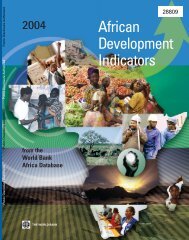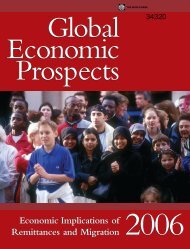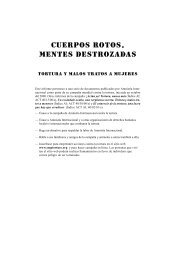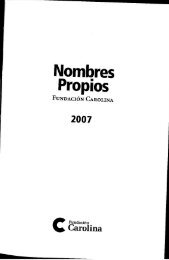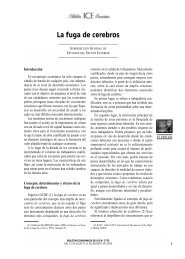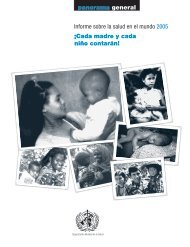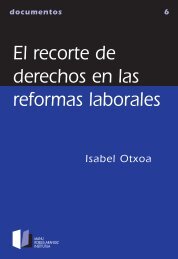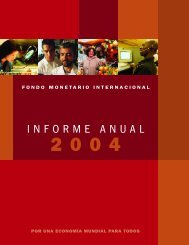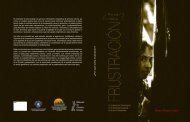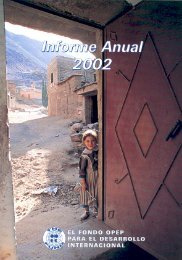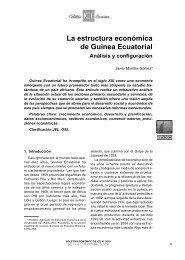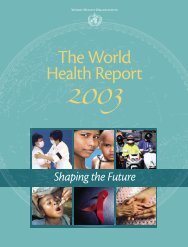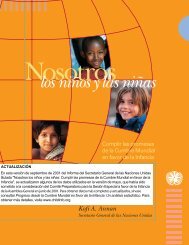Educación para todos: el imperativo de la calidad; Informe ... - eFaber
Educación para todos: el imperativo de la calidad; Informe ... - eFaber
Educación para todos: el imperativo de la calidad; Informe ... - eFaber
- No tags were found...
Create successful ePaper yourself
Turn your PDF publications into a flip-book with our unique Google optimized e-Paper software.
REFERENCIAS / 449NACIONES UNIDAS. 2000. Dec<strong>la</strong>ración d<strong>el</strong> Milenio <strong>de</strong> <strong>la</strong>s Naciones Unidas. Resolución aprobada por <strong>la</strong> AsambleaGeneral (A/RES/55/2) (www.un.org/millennium/<strong>de</strong>c<strong>la</strong>ration/ares552e.htm).—. 2001a. Comité <strong>de</strong> Derechos d<strong>el</strong> Niño. Observación General Nº 1: propósitos <strong>de</strong> <strong>la</strong> educación (CRC/GC/2001/1).Apéndice, párrafo 9.—. 2001b. <strong>Informe</strong> <strong>el</strong>aborado por <strong>el</strong> Pan<strong>el</strong> <strong>de</strong> Alto Niv<strong>el</strong> sobre Financiación <strong>para</strong> <strong>el</strong> Desarrollo.(www.un.org/reports/financing/full_report.pdf)—. 2003a. Post-Monterrey <strong>de</strong>v<strong>el</strong>opment aid report card (Financing for Dev<strong>el</strong>opment Briefing, note 2.)(www.un.org/esa/ffd/1003brief-Oda.pdf)—. 2003b. Aplicación y seguimiento <strong>de</strong> los compromisos y acuerdos alcanzados en <strong>la</strong> Conferencia Internacionalsobre <strong>la</strong> Financiación <strong>para</strong> <strong>el</strong> Desarrollo (A/58/216). <strong>Informe</strong> d<strong>el</strong> Secretario General, 58º periodo <strong>de</strong> sesiones<strong>de</strong> <strong>la</strong> Asamblea General.Nassor, S.; y Mohammed, A. K. 1998. The quality of education: some policy suggestions based on a survey ofschools, Zanzibar. París, Ministerio <strong>de</strong> Educación Básica <strong>de</strong> <strong>la</strong> República Unida <strong>de</strong> Tanzania/InstitutoInternacional <strong>de</strong> P<strong>la</strong>neamiento <strong>de</strong> <strong>la</strong> Educación (IIPE) <strong>de</strong> <strong>la</strong> UNESCO (<strong>Informe</strong> sobre investigación <strong>de</strong> políticasd<strong>el</strong> SACMEQ, Nº 4).National Research Council (EE.UU.). 2001. Eager to learn: educating our preschoolers. Washington, D. C., NationalAca<strong>de</strong>my Press.Neal, D. A.; y Johnson, W. R. 1996. “The role of pre-market factors in b<strong>la</strong>ck-white differences”. Journal of PoliticalEconomy, Vol. 104, Nº 5, págs. 869-695.Neuf<strong>el</strong>d, E.; Farrar, E.; y Miles, M. B. 1983. A review of effective schools research: the message for secondaryschools. <strong>Informe</strong> presentado a <strong>la</strong> National Commission on Exc<strong>el</strong>lence in Education.Newman, J.; Rawlings, L.; y Gertler, P. 1994. “Using randomized control <strong>de</strong>signs in evaluating social sectorprograms in <strong>de</strong>v<strong>el</strong>oping countries”. World Bank Research Observer, Vol. 9, Nº 2, págs. 181-201.Niane, B. 2004. Innovation and reform to improve basic education quality in Senegal to achieve EFA goals.Documento <strong>de</strong> referencia <strong>para</strong> <strong>el</strong> <strong>Informe</strong> <strong>de</strong> Seguimiento <strong>de</strong> <strong>la</strong> EPT en <strong>el</strong> Mundo 2005.Nirantar. 1997. “Innovating for change: women’s education for empowerment. An analysis of the Mahi<strong>la</strong> SamakhyaProgram in Banda District (India)” en W. Mauch y U. Papen (compi<strong>la</strong>dores), Making a difference: innovations inadult education. París/Francfort, Instituto <strong>de</strong> <strong>la</strong> UNESCO <strong>para</strong> <strong>la</strong> Educación/Fundación Alemana <strong>para</strong> <strong>el</strong>Desarrollo Internacional, Peter Lang, GmbH, págs. 33-47.Nkamba, M.; y Kanyika, J. 1998. The quality of education: some policy suggestions based on a survey of schools,Zambia. París, Ministerio <strong>de</strong> Educación <strong>de</strong> Zambia/Instituto Internacional <strong>de</strong> P<strong>la</strong>neamiento <strong>de</strong> <strong>la</strong> Educación (IIPE)<strong>de</strong> <strong>la</strong> UNESCO (<strong>Informe</strong> sobre investigación <strong>de</strong> políticas d<strong>el</strong> SACMEQ, Nº 5).Nordström, K. 2004. Quality education for persons with disabilities. Documento <strong>de</strong> referencia <strong>para</strong> <strong>el</strong> <strong>Informe</strong> <strong>de</strong>Seguimiento <strong>de</strong> <strong>la</strong> EPT en <strong>el</strong> Mundo 2005.Nyerere, J. 1968. Freedom and socialism. Antología <strong>de</strong> escritos y discursos, 1965-1967. Dar es-Sa<strong>la</strong>am, OxfordUniversity Press.Nzomo, J.; Kariuki, M.; y Guantai, L. 2001. The quality of education: some policy suggestions based on a surveyof schools, Kenya. París, Ministerio <strong>de</strong> Educación, Ciencia y Tecnología <strong>de</strong> Kenya/Instituto Internacional <strong>de</strong>P<strong>la</strong>neamiento <strong>de</strong> <strong>la</strong> Educación (IIPE) <strong>de</strong> <strong>la</strong> UNESCO (<strong>Informe</strong> sobre investigación <strong>de</strong> políticas d<strong>el</strong> SACMEQ, Nº 6).OCDE. 1996. Instructional Time in the C<strong>la</strong>ssroom. Centro <strong>para</strong> <strong>la</strong> Investigación e Innovación Educativas (CERI),Panorama <strong>de</strong> <strong>la</strong> educación, Indicación <strong>de</strong> <strong>la</strong> OECD. París, OCDE.—. 1998. Education at a G<strong>la</strong>nce: OECD Indicators 1998. París, OCDE.—. 2001. Education Policy Analysis. París, OCDE.—. 2003a. “Phi<strong>la</strong>nthropic Foundations and Dev<strong>el</strong>opment Co-Operation”. Se<strong>para</strong>ta d<strong>el</strong> DAC Journal, Vol. 4, Nº 3(www.oecd.org/dataoecd/23/4/22272860.pdf);—. 2003b. Attracting, <strong>de</strong>v<strong>el</strong>oping and retaining effective teachers. Documento <strong>de</strong> referencia <strong>para</strong> los Países Bajos.París, OCDE, párrs. 85-89.—. 2003c. Panorama <strong>de</strong> <strong>la</strong> educación: Indicadores <strong>de</strong> <strong>la</strong> OECD 2003. Editorial Santil<strong>la</strong>na, México D.F.—. 2004a. Innovation in the Knowledge Economy: Implications for Education and Learning. París, OCDE.—. 2004b. Knowledge Management; New Challenges for Educational Research. A Review of National EducationalResearch and Dev<strong>el</strong>opment Systems in the Untied Kingdom and New Zea<strong>la</strong>nd. París, OCDE.—. 2004c. Raising the quality of educational performance at school. Síntesis <strong>de</strong> políticas. París, OCDE.—. 2004d. Reviews of National Policies for Education: Chile. París, OCDE.—. 2004e. The Quality of the Teaching Workforce. Síntesis <strong>de</strong> políticas. París, OCDE.



